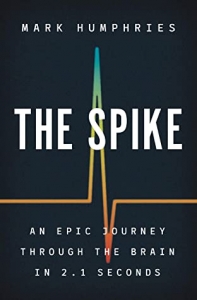Neurons are the fundamental building blocks of the brain. In the human brain, billions of these neurons communicate and liaise with one another using spikes, blips of electric voltages. Studying and understanding how these spikes emerge in the brain, how they travel through the brain and how this communication leads to meaningful actions are part of the cutting edge research in the field of neuroscience. In this episode of Bridging the Gaps I speak with professor Mark Humphries and discuss the research that he presents in his new book “The Spike: An Epic Journey Through The Brain in 2.1 Seconds”. This is a deeply informative account of the journey that these electrical signals take as they move from one neuron to another and eventually lead us to act. The book tackles previously unanswered mysteries: Why are most neurons silent? What causes neurons to fire spikes spontaneously, without input from other neurons or the outside world? Why do most spikes fail to reach any destination? In this thorough discussion with professor Mark Humphries, we touch upon these fascinating questions and intriguing concepts.
Mark Humphries is Chair in Computational Neuroscience at the University of Nottingham. He is the founding editor of “the Spike” an online publication available at Medium dot com.
I begin our conversation by asking Mark about the structure of an individual neuron and how spikes emerge in a single neuron. We then discuss the concept of Dark Neuron and talk about the spikes that don’t lead to new spikes and just fail. A very interesting question is what do these spikes mean and how do these spikes carry messages from one point in the brain to another. In the book, Mark reports two groups of researchers holding two different viewpoints, these are “The Timers” and “The Counters”. I ask Mark “who are the timers” and “who are the counters” and what are their viewpoints on the question that how these spikes carry messages from one point in the nervous system to another. And finally we discuss how research is conducted in the fields of neuroscience and computational neuroscience. We particularly discuss progress that the researchers are making in the field of computing neuroscience.
Complement this podcast with the fascinating discussion with Professor David Badre “On Task: How Our Brain Gets Things Done” and then listen to Professor Daniel Schacter on “Seven Sins of Memory”







Connect With Us